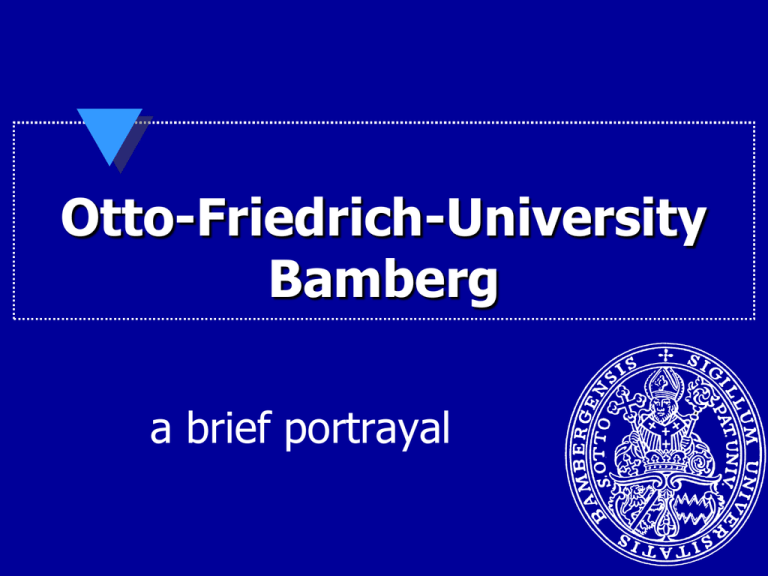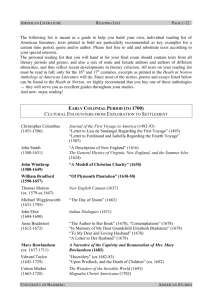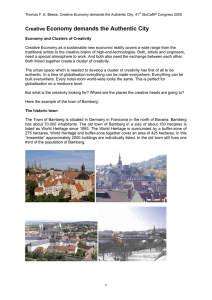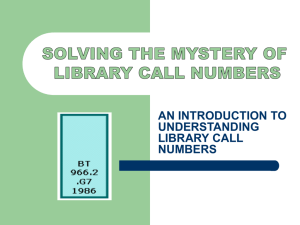Otto-Friedrich-Universität Bamberg
advertisement

Otto-Friedrich-University Bamberg a brief portrayal A brief history 1647: Prince Bishop of Bamberg, Melchior Otto Voit von Salzburg, issued the deed of foundation for an “Academia”. Teaching began one year later. 1735 Faculty of Law 1749 Faculty of Medicine 1773 Universitas Ottoniana-Fridericiana 1803 deed repealed, only theological and philosophical studies continued 1939 closed by government 1945 teaching began again in Theology and Philosophy and also in Law, political and natural Sciences Second Foundation 1972 Second Foundation 1988 Given the old name: Otto-Friedrich-University The Reorganisation and Reconstruction of the University took place based on the concept of a University in the town - listed by UNESCO as a World Heritage Site. Faculty of Catholic Theology Old Testament New Testament Church History Dogmatics Fundamental Theology Social and Individual Ethics in the building of the former Jesuit-College Church Law Pastoral Theology, Liturgy Religious Education Faculty of Education Science, Philosophy and Psychology Philosophy Psychology Education Science in the building of the former gynacological Clinic Teacher Training (and Educational Theory) in several subjects Faculty of Language an Literature GermanLanguage and Literature English Language and Literature Roman Laguages and Literature Latin / Greek Slavic Studies i.a. in the building of the former Jesuit School Oriental Studies Communications Science Faculty of History and Geography History Art History Heritage Conservation Archaeology in the so called Weddinghouse and the former Slaughterhouse European Ethnology Geography Faculty of Social and Economic Sciences Sociology Political Science Economics Business Administration Economics and Business Education in the building of the former Teacher Training Centre Law Statistics Faculty of Applied Computer Sciences in the building of the former Teaching-Trainer Centre Information Systems Applied Computer Sciences - in Media Studies - in the Humanities - in Cultural Sciences - in Communications Theory Principles of Information Technology School for Social Work In accordance with the regulations that apply to a Polytechnic: in the building of a former leather manufacturer Social Work and several subjects Centres of Excellence Centre for Medieval Studies Centre for Interreligious Studies Centre for European Studies Centre for Interdisciplinary Computing Centre for Research and Teaching in Didactics/Teaching methodology Facts and Numbers 138 (Full-) Professors 300 Academic staff 260 Staff (administration, library, etc.) 8850 Students Graduate Schools Science of Art – Heritage conservation Common anthropological elements in Christianity and Islam Markets and social systems in Europe Consciousness and conflicts between generations in antiquity and the middle ages High-technology entrepreneurship Focus 1 Language based cultural Area-Studies Orientalism: Arabic, Iranic and Turkish Language, Literature, Culture and History; Islamic / Religious Studies Slavic Language, Literature, Culture and History Focus 2 Medieval Studies incl. applied Science of Art and protection of Cultural Assets History, Languages, Literature, Art History and Philosophy of Middle Ages Archaeology, Heritage Conservation Focus 3 Social and Behavioural Studies Sociology (incl. Demography) Political Science (incl. Public Administration) Psychology Focus 4 Economic Studies with a focus on Europe and the international area European Business Administration European Economic Studies Focus 5 Applied Computer Science Information Systems Applied Computer Science in the Media Studies Applied Computer Science in the Humanities and in Cultural Studies Cognitive Systems Rankings (Spiegel, 2004) Rankings (Spiegel, 2004) International Relations Student exchanges with 137 institutions worldwide 27 of them are partner universities More than 30 % of the students per year complete part of their studies abroad Non-German students represent 10 % of the current student body International Office Introduction and welcome weeks German courses (Tandem program) Student´s residences Student organisations Sports and cultural events University with a new profile in an old town Problems? Not at the University of Bamberg! • Extremely limited resources • Bachelor/Master degrees • Internationalization of faculty Program for our next 2 days Monday Tuesday 09:00 Welcome and presentation of Bamberg University 09:30 – 10:30 International Entrepreneurship: Joint seminars/projects bet-ween ASU & Bamberg, ASU & Alicante and UNF & Alicante 10:30 - 11:00 Coffee break 11:00 – 12:00 International Entrepreneurship at the U Bamberg: Two examples 12:00 – 13:00 Lunch 13:00 – 18:00 Groupwork (2 groups) 19:00 Dinner at Palais Schrottenberg 09:00 – 09:30 Bamberg as a business region 09:30 – 10:00 Student experiences in the U.S. 10:15 – 11:30 AIESEC: How students support student exchange 11:30 Quick Lunch 12:15 – 14:00 Presentation of Prof. Michael Mirow, former head of business development at Siemens AG 14:30 – 15:30 Presentation of the North Bavarian Business Plan Competition (Dr. Carsten Rudolph) 16:00 – 17:00 Guided tour: Bamberg’s cribs 17:00 – 20:00 Free time (Visit of Bamberg’s Christmas market)?? Evening: t.b.a.










